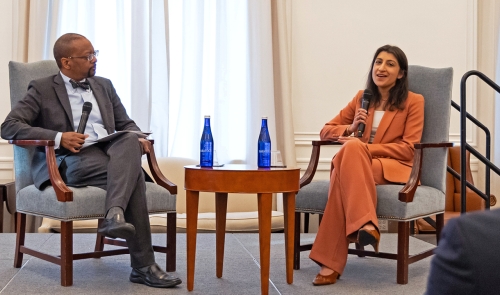In Katzmann Lecture, Lina Khan talks about reinvigorating the FTC

As a law student, Lina Khan authored a prizewinning law review note that offered a groundbreaking, influential analysis of Amazon’s market power. At age 32, she became the youngest-ever chair of the Federal Trade Commission (FTC), where she implemented a revived emphasis on active rulemaking and enforcement by the agency. On April 28, in the fourth annual Robert A. Katzmann Lecture, Khan sat down with Dean Troy McKenzie ’00 for a public conversation about her path in antitrust law and her work at the FTC. The annual lecture honors the career and impact of the late Judge Katzmann of US Court of Appeals for the Second Circuit, a professor of practice at NYU Law.
Now an associate professor at Columbia Law School, Khan said that she originally planned to become a business journalist. When she graduated from college soon after the financial crisis of 2008, however, she took a job studying markets at the research group New America Foundation. “I spent years doing deep dives into industries like the chicken farming industry, airlines, book publishing, rental cars,” she recalled. In particular, she focused on the effects of decades of industry consolidation through mergers and acquisitions. “[I] got a 360 view of the different ways that extreme consolidation can hurt people, both through higher prices but also through lower wages, through market access being closed off to start-ups and entrepreneurs, as well as an ability for unchecked monopolies to really abuse their power and coerce people in their day-to-day lives,” Khan said.
Watch video of the Katzmann Lecture:
Her budding interest in antitrust law took her to Yale Law School, where she drew on her previous research experience to write a student note, “Amazon’s Antitrust Paradox,” for the Yale Law Review. Khan’s paper argued that then-current antitrust doctrine, which focused on protecting price competition, was unable to address the harms of market dominance by digital companies. Writing the paper took two years, and it was rejected the first time she submitted it, Khan said. “Shortly after it got published, though, I actually started hearing from general counsels at major firms that were running into various challenges with Amazon and hadn’t quite figured out what the right [way] was to be framing their arguments,” she added.
For decades, Khan said, under the influence of authorities such as Judge Robert Bork and Judge Frank Easterbrook, the FTC prioritized underenforcement, relying on markets to correct monopoly power. “What we’ve now learned over the last decade is that in digital markets…because of how network effects and the self-reinforcing advantages of data work, monopoly power that goes unaddressed by enforcers early can be much more difficult to dislodge,” Khan said.
After law school, Khan served as legal director at the Open Markets Institute, worked as counsel to the antitrust subcommittee of the US House Judiciary Committee, and taught at Columbia Law. In 2021, she was appointed by President Joe Biden first as an FTC commissioner and then as FTC chair.
McKenzie noted that Khan had reinvigorated FTC rulemaking—including a rule restricting non-compete clauses in employment contracts that was later struck down by courts. “Is it worth doing something like that even when you’re not assured at the outset that a rule or decision by the commission will survive?” he asked her.
Rulemaking can streamline enforcement and unlock additional remedies, Khan argued. “Once we proposed this rule, we actually got 26,000 comments from people all across the country, oftentimes sharing devastating stories about how non-competes had affected them,” Khan said. She also cited economic research showing that non-compete agreements can reduce both wages and corporate innovation. “It was an area where we thought that private enforcement and private action would not be able to fully cure the illegality of these non-competes or really result in meaningful remedies,” she said.
Khan also talked about making more vigorous use of the FTC’s powers under Section 5 of the Federal Trade Commission Act, which authorizes the agency to take action against unfair or deceptive trade practices and unfair competition. Following some high-profile losses in court in the 1980s, she said, the FTC had retreated from using Section 5, and antitrust enforcement became concentrated in the Antitrust Division of the US Department of Justice.
“When I joined the FTC, it seemed important to dust off and fully assert the unique institutional authority that the FTC had been given, for a panoply of reasons,” she said. “I think there are actual business practices that you cannot reach under the antitrust laws that we should be making sure we are going after.”
Khan closed with a shoutout to one of the members of the audience, Eleanor Fox ’61, Walter J. Derenberg Professor of Trade Regulation Emerita. “I just want to acknowledge her extraordinary contributions to antitrust, which have just been such an inspiration for me,” Khan said. “A lot of the revival…in antitrust over the last few years can really be traced back to Professor Fox’s scholarship in the early ’80s, when she was sounding the alarm on the risks of the major shift that was happening.”



